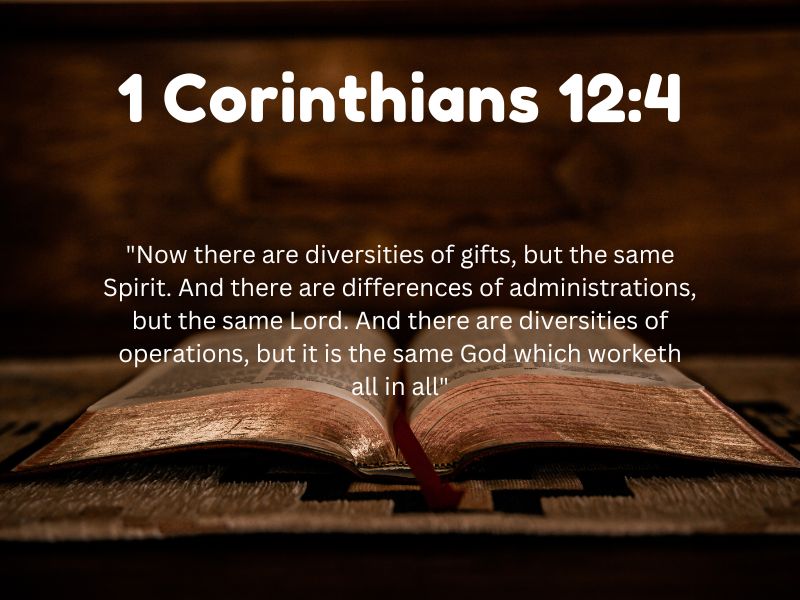The Bible verses for farmers are relevant scriptures connected to agriculture, along with other information related to farming. This article focuses on the biblical explanations of farming.
Farming is frequently referenced in the Bible as a way of life and a means of providing for one’s necessities. Farmers are portrayed as hardworking and industrious as they plow the soil and tend to their crops.
Explanations from the Bible of what a farmer works, who a farmer is, how a farmer lives, and how a farmer interacts with others.
This will demonstrate the historical progression of farmers from the time of the Bible. Here are some Bible verses that may be relevant for farmers:
15 Bible verses for farmers
Deuteronomy 28:12
The LORD will send rain at the proper time from his rich treasury in the heavens and will bless all the work you do. You will lend to many nations, but you will never need to borrow from them.-

This bible verse explains that God will make you the lender to many nations, and you will never need to borrow from them.
God will throw open the doors of his sky vaults and pour rain on your land on schedule and bless the work you take in hand. You will lend to many nations but you yourself won’t have to take out a loan.
This is the promise of God to humanity. God is slow to anger, but swift to show mercy. It is his delight to bless.
It is better that we should be drawn to what is good by a child-like hope of God. Our labor can never be in vain, He, the lord has promised to bless the works of our hands.
It is certain that his children will reap the fruit of their labor, this God has spoken.
Genesis 27:28
May God give you of the dew of heaven and of the fatness of the earth and plenty of grain and wine.-
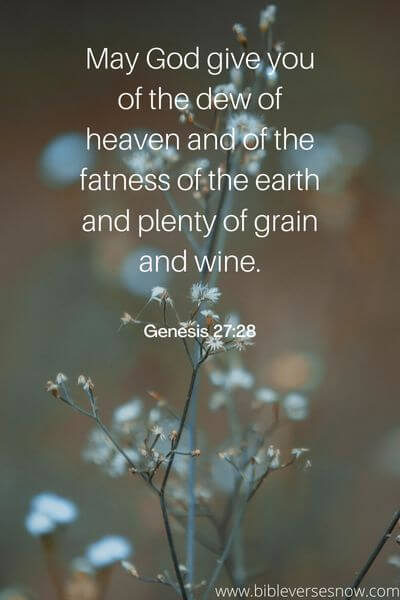
This chapter explains further when Rebekah commands Jacob to impersonate Esau, instead, in order to get the blessing for himself.
Isaac almost catches on but is convinced by the smell of Esau on Jacob’s borrowed clothes and the hairy, Esau-like goat’s skin on Jacob’s hands. Isaac gives to Jacob the future-defining blessing of God.
The moral lesson derived in this chapter concerning Esau and Jacob is to explain that Esau was hungry, but his life was not in danger.
He placed more value on satisfying his hunger than on the blessings and covenants of his birthright.
In what ways do we sometimes choose things of temporary value instead of things of eternal value?
Placing value on temporary things was what Esau gave into rather than the external value which will same in season and out of season.
Let’s go of necessity first and not walk in the path of Esau.
Jeremiah 17:7-8
7 “Blessed is the man who trusts in the LORD
And whose trust is the LORD.8 “For he will be like a tree planted by the water,
That extends its roots by a stream
And will not fear when the heat comes;
But its leaves will be green,
And it will not be anxious in a year of drought
Nor cease to yield fruit.-

The summary of these scriptures is thus, Anyone can trust the lord God that he will do that which he promised. He has expectations of an outcome.
But the one whose trust is the lord has a spiritual maturity from knowing the lord so intimately that he leaves the outcome in God’s hands without expectation.
Thus, The expectations of the righteous can never be cut off. This simply means that he who trusts in the lord always is totally free and confident in the blessings of God.
The blessings of God maketh rich. We have to trust in the lord always he is our hope and our fortress.
John 1:5
And the light shineth in darkness; and the darkness comprehended it not.-
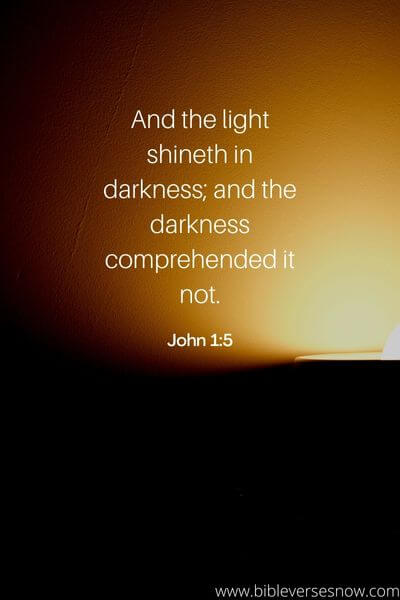
This is to tell you that God is the light of pure goodness, perfect righteousness, and absolute truth. He is the very definition of holiness itself.
Darkness represents sin and evil which we are mandated by God to stay away from. Sin and evil are of the devil it’s not what our father possesses or instructs us his sons to do.
Jesus is fully God and fully human and is our source of life and light. God responds to the sin and brokenness of creation by sending his son to overcome the darkness of this world. Followers of Jesus find hope in Jesus being the eternal Word.
Ecclesiastes 11:4
Farmers who wait for perfect weather never plant. If they watch every cloud, they never harvest.-
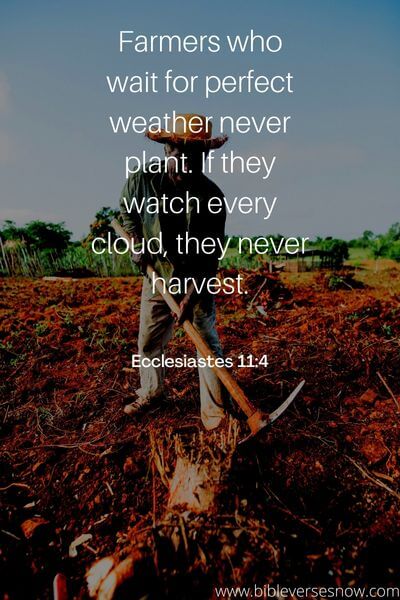
Ecclesiastes 11 verse 4 states that he who neglects the necessary works of sowing and reaping because the weather is not exactly suitable to his desires will lose his harvest.
Whereby he intimates, that men will never do good here, which is expressed by sowing, and consequently not receive good hereafter, which is called reaping if they are discouraged from it by every doubt and difficulty.
That we sow, surely shall we reap. This is the promise of God to humanity, we shall never sow on rocky ground and we shall reap our hard work as he will bless us and make that we planted or started to grow and yield fruit for harvest.
Remember his promise which was, I will bless the works of your hands, this is of God also adding that we will never labor in vain.
Proverbs 20:4
Those too lazy to plow in the right season will have no food at the harvest.-
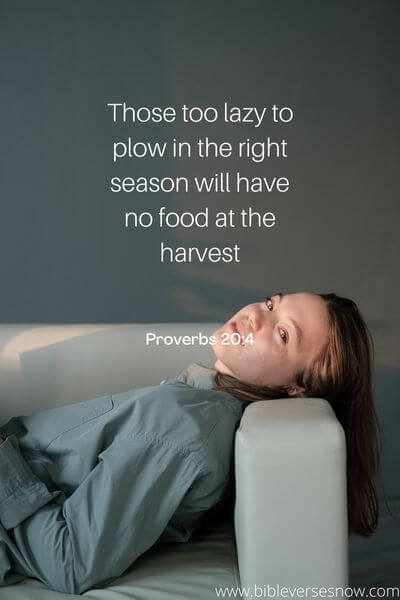
In this Verse, The Bible calls those who refuse to work unless they “want to,” or finds it “rewarding,” lazybones. It predicts a hungry future for them.
Farmers have to plow in the fall, and youngsters have to “plow” in today’s world by getting an education. Only then can both expect a harvest.
You definitely can’t expect a harvest if you never invested in anything, you just can’t reap where you never sowed.
This is to elaborate on the importance of sowing. A farmer can only go hungry if despise the fact to plant, you expect a harvest when it season comes.
Farming analogies in the Bible
John 15:1-5 Says,
“I am the true vine, and My Father is the vinedresser. Every branch in Me that does not bear fruit He takes away; and every branch that bears fruit He prunes, that it may bear more fruit.
Mark 4:26-29 Says,
‘The kingdom of God is as if a man should scatter seed on the ground, and should sleep by night and rise by day, and the seed should sprout and grow, he himself does not know how. For the earth yields crops by itself: first the blade, then the head, and after that the full grain in the head.
Matthew 13:30
Let both grow together until the harvest, and at the time of harvest I will say to the reapers, “First gather together the tares and bind them in bundles to burn them, but gather the wheat into my barn.”
Who was a farmer in the Bible
List of farmers in the Bible
There are several farmers mentioned in the Bible. Here is a list of some of them:
Abraham:
Abraham was a wealthy farmer and the father of the Jewish people. He is mentioned several times in the Bible, particularly in the book of Genesis.
Isaac:
Isaac was the son of Abraham and the father of Jacob. He was also a farmer, and the Bible describes him as a man who reaped a hundredfold in the same year that famine struck the land (Genesis 26:12).
Jacob:
Jacob was the son of Isaac and the father of the twelve tribes of Israel. He worked as a farmer and a shepherd and is mentioned several times in the Bible.
Boaz:
Boaz was a wealthy farmer who owned a field in Bethlehem. He is mentioned in the book of Ruth, where he marries Ruth, a widowed Moabite woman who had come to work in his field.
Gideon:
Gideon was a judge and military leader in ancient Israel. He was also a farmer, and the Bible tells the story of how he was chosen by God to lead the Israelites in the battle against their enemies (Judges 6-8).
Zacchaeus:
Zacchaeus was a wealthy tax collector who worked for the Roman authorities. He is mentioned in the New Testament, where it is said that he was a “chief tax collector and was wealthy” (Luke 19:2). It is not specifically stated that he was a farmer, but it is possible that he owned land or was involved in agriculture in some way.
What Bible verses talk about farmers?
Listed below are the bible verses that talk about a farmer, we have different farmers in the bible starting from Adam when creation begone where he was to take care of the garden of Eden, Amos, Noah, Boaz, and Uzziah all were farmers.
Genesis 1:11
And God said, “Let the earth sprout vegetation, plants yielding seed, and fruit trees bearing fruit in which is their seed, each according to its kind, on the earth.” And it was so.-
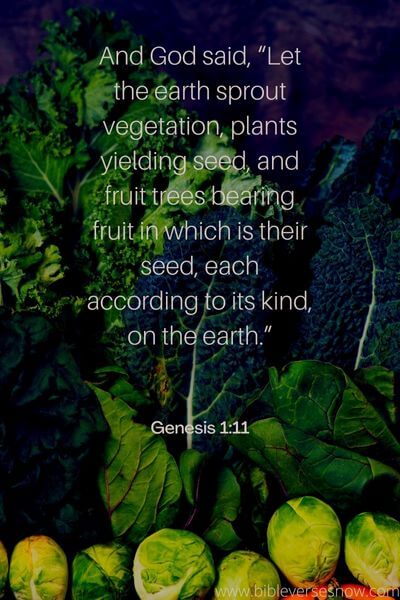
This passage shows a repeated theme of rebellion, from the garden to Cain and Abel, the “sons of God,” the flood, and finally Babylon.
God continues to give humanity the chance to bring blessings into the world, and they continually choose their own way.
It talks more about the sovereignty of the Creator, the nature of His creation, and the extent of its ruin.
God said rebellion is the sin of witchcraft. Rebellion is an attitude displayed to contradict authority. The rebellion started from the beginning of Creation.
When God created Adam and Eve, He put them in the Garden of Eden and gave them instructions on what to do and what not to do.
When you have eaten your fill, be sure to praise the LORD your God for the good land he has given you.-

Deuteronomy 8 begins with Moses reminding Israel to do all the commandments God commanded them to do.
They were to remember how God humbled them in the wilderness those 40 years to prove them and see what was in their heart. God proved them to see if they would keep the commandments or not.
The Israelites were to praise God for the good land which He has given them. God’s gifts and provisions should not be taken for granted.
He gives His children what they need as it is written ask and it shall be given, seek and ye shall find, knock and it will be open on to you.
God promised the Israelites that he is bringing them into a good land, a land of brooks of water, of fountains and springs, flowing forth in valleys and hills; a land of wheat and barley, of vines and fig trees and pomegranates, a land of olive oil and honey; a land where you shall eat food without scarcity, in which you shall not.
Hebrews 6:7
For land that has drunk the rain that often falls on it, and produces a crop useful to those for whose sake it is cultivated, receives a blessing from God.-
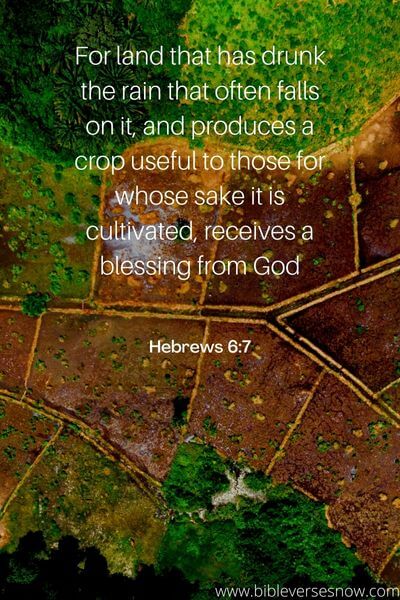
Hebrews 6:7 discusses the concept of repentance. “For the earth that drinks in the rain that often falls upon it, and bears plants useful for people by whom it is cultivated, receives a blessing from God,” the author states in this passage.
To emphasize the idea of repentance, the author uses the metaphor of a farm or garden. A person needs to accept the “rain” of God’s grace to grow and bear spiritual fruit, just as a farm needs rain to grow and produce fruit.
The positive activities or deeds that a person performs as a result of the verse’s reference to “herbs”.
Deuteronomy 28:12
The LORD will send rain at the proper time from his rich treasury in the heavens and will bless all the work you do. You will lend to many nations, but you will never need to borrow from them.-
The Bible verse Deuteronomy 28:12 is a part of a section in which God promises the Israelites rewards if they obey his commands and curses if they do not.
The particular verse reads:
“The heavens, the Lord’s wonderful storehouse, will be unlocked for you, allowing the rain to fall on your land in its season and blessing all of your labor.
And while you will lend to many different countries, you won’t borrow.”
According to this scripture, if the Israelites keep God’s instructions, he will bless their land with rain at the proper seasons and ensure the success of their harvests and other endeavors.
Additionally, they will be permitted to lend to other countries, although.
Psalm 24:5
He will receive blessing from the LORD and righteousness from the God of his salvation.-
Psalm 24 is a psalm of David that describes the majesty and sovereignty of God. It begins by asking who may ascend the mountain of the Lord and enter his holy presence. In verse 5, the psalm says:
“He shall receive a blessing from the Lord, and righteousness from the God of his salvation.”
This verse is saying that those who are able to enter the Lord’s presence and worship him will receive a blessing and righteousness from God.
The phrase “the God of his salvation” refers to God as the source of salvation for his people. This verse reminds us that God is the one who blesses and provides righteousness for those who seek him and worship him in his holy presence.
Biblical farming principles
The Bible makes reference to a number of farming principles. These ideas can be divided into a number of categories, such as ideas about the land, ideas about the crops, and ideas about the people who work the land. Here are a few illustrations of these guidelines:
Land: According to what the Bible teaches, the land is a gift from God that should be properly cared for and utilized.
This entails not overworking the soil, giving it time to rest occasionally, and refraining from actions that are bad for the land, such as applying excessive amounts of chemical fertilizers or pesticides.
Crops: According to what the Bible says, crops should be farmed sustainably and with consideration for human needs.
Crops are primarily for human consumption and part a commercial gain too whereas other people stand to benefit from the faithfulness of God.
Faith of a farmer
A person who works in agriculture may have religious beliefs and practices that are considered to be part of their faith.
Farmers may practice a particular religion or spiritual tradition and may integrate their faith into their everyday work on the farm depending on their cultural and personal backgrounds.
Some farmers may experience a sense of connection to the land and the natural world as well as a sense of purpose and meaning in their job as a result of their religious beliefs.
Additionally, it might affect how they farm, for example, by encouraging them to use sustainable or ecologically friendly methods.
Agriculture and religious and spiritual traditions have long been connected since farming has frequently been considered a way of life that is strongly related to.
Jesus and farming
In the first century AD, a Jewish teacher and preacher by the name of Jesus lived. The New Testament of the Bible states that Jesus was born in Bethlehem and spent most of his adult life wandering the Galilee region, preaching and working miracles.
No concrete evidence exists to suggest that Jesus was a farmer or engaged in farming operations.
However, considering that farming played a significant role in the local economy where Jesus lived, it is plausible that Jesus had some experience with it.
To provide for themselves and their families, many people in that time and place would have been involved in farming or other agricultural activity.
God is a farmer
It is customary for humans to describe God or a higher force using metaphors and symbolism.
Some people would view God as a farmer, while others might perceive him or her as a loving father, a creative force, or a source of knowledge and wisdom.
In the end, individuals’ views and understandings of God are personal and unique, and various people may hold different opinions.






